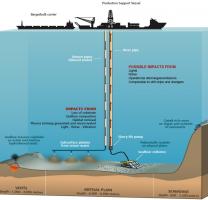
Graphic: IUCN
Deep-sea mining may provide the material necessary to create our latest and greatest electronics, electric cars and battery backup systems. The mining may also damage the environment and worsen climate change.
In 2018, we posted about the discovery of huge deposits of rare-earth metals in seabed mud off the Japanese island Minamitorishima, located 1,150 miles southeast of Tokyo. The discovery could have a major impact on both the Japanese and the world economy. Rare-earth metals are essential to modern technologies and are used in smartphones, hybrid vehicles, rechargeable batteries, wind turbines, light-emitting diodes, compact fluorescent lamps, screen display panels, and many medical and military technologies.
In recent years, China has had a near-monopoly on the production of rare-earth metals, extracting 85 to 95 percent of the world’s rare-earth metal supply from large clay deposits in the country’s south. The Japanese discovery may break that monopoly provided that the materials can be mined in the depths of over 5,500 meters.
Recently, there have been reports of a race to mine the deep sea for other forms of metal – cobalt and other sought-after minerals used to make lithium-ion batteries for electric cars and as storage for solar power systems. Interest is focussed on the deep seafloor of the Central and Western Pacific.
NOAA notes that the International Seabed Authority (ISA) is the organization that oversees deep-sea mining activities within international waters, and has already approved three exploration contracts for Fe-Mn crust extraction in the Western Pacific for the Ministry of Natural Resources and Environment of the Russian Federation, the Japan Oil, Gas and Metals National Corporation (JOGMEC), and the China Ocean Mineral Resources Research and Development Association (COMRA).
The optimal depth range for mining crusts is 1,500-2,500 meters (4,500-7,500 feet). The process will involve the removal of the top mineral-rich layer of the substrate along with all of the benthic animals that may be living on it.
Those involved in planning for this new industry are aware of the potentially severe ecological consequences of crust mining; however; it is not clear what measures can and should be taken to avoid irreparable harm to the benthic communities in the Pacific.
Not surprisingly, environmentalists oppose the plans, claiming that the mining could release carbon and worsening climate change.
Scientific American reports: The Deep Sea Conservation Coalition, the International Union for Conservation of Nature and Greenpeace—which initially emphasized risks to biodiversity and the potential for permanent damage wrought to sensitive ecosystems—are now more closely scrutinizing the climate implications of allowing private companies to dig cobalt and other sought-after minerals used to make lithium-ion batteries.
“By impacting on natural processes that store carbon, deep-sea mining could even make climate change worse by releasing carbon stored in deep-sea sediments or disrupting the processes which help scavenge carbon and deliver it to those sediments,” Greenpeace argued in a report issued ahead of the talks.
Thanks to Alaric Bond for contributing to this post
